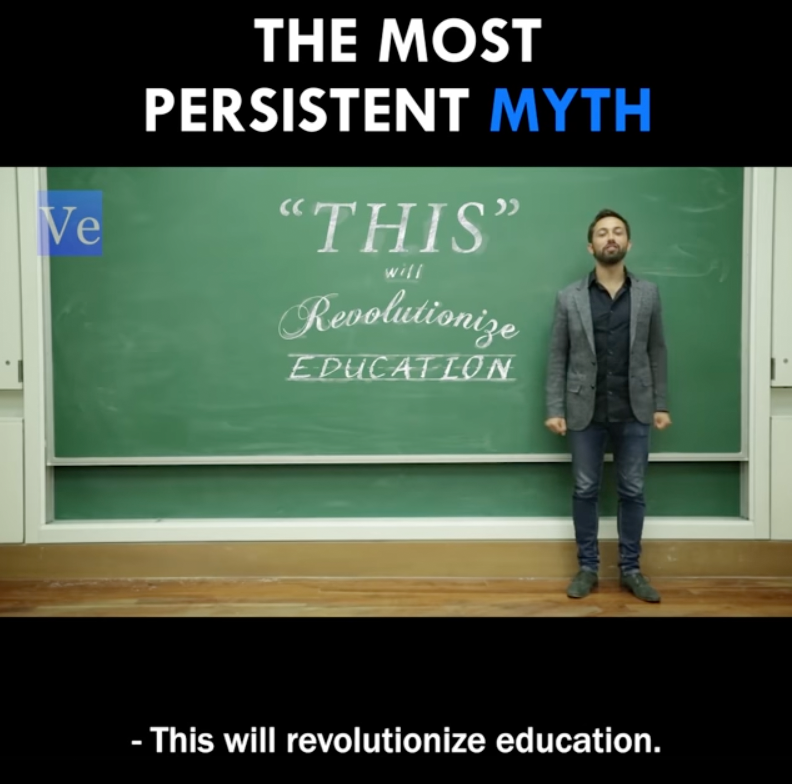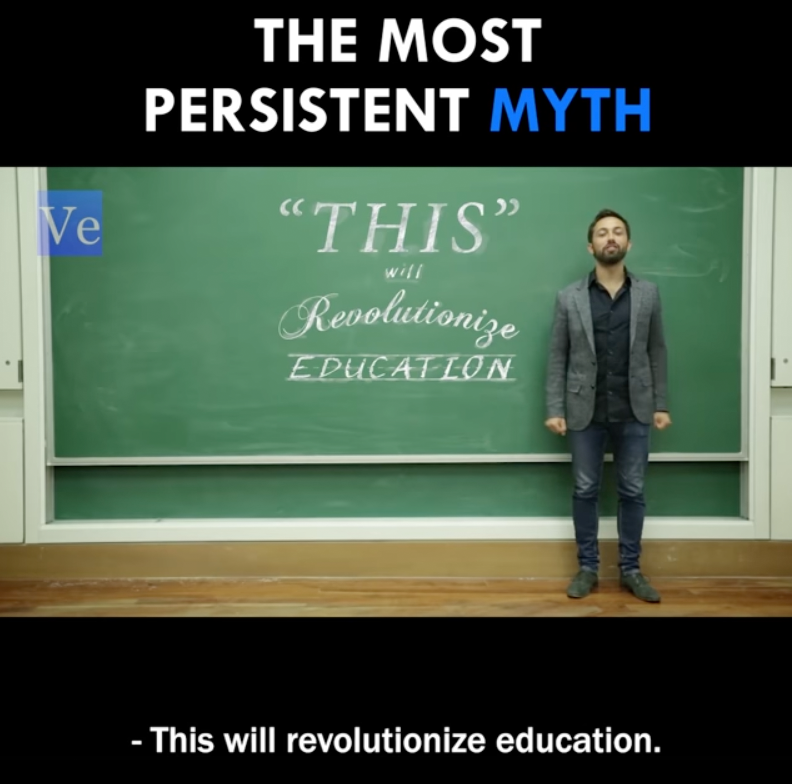The Prediction That We Always Get Wrong (And Never Learn From)

I stumbled onto a video from Derek Muller's Veritasium channel (linked below) that made me think about the Amazon/entrepreneurial space and how people learn. The video was about how "this technology will revolutionize education!" and, spoiler alert, history has repeatedly proven that this is false.
Let me explain:
As someone who helped kick off many online communities of entrepreneurs, Amazon sellers, software providers, t-shirt designers, and self-published authors, I've seen a lot over the past ten years.
I've seen lots of communities pop up that openly help each other and share information. Lots of online courses designed to walk students through the entire process of learning a new skill. Lots of events and conferences where you can meet and interact with industry experts. Lots of YouTube channels uploading educational content. Lots of books published in paperback and on Kindle.
There is no shortage of information and content specifically designed to help people learn new information. So when everyone has access to all of these things, why do some people achieve their goals while so many others never seem to make any progress?
Maybe this sounds like you? Do you feel as though you've been spending years trying to learn something that you feel other people are picking up quickly? Do you feel frustrated that you know that you have access to all of the information that you'd ever need but you've been unable to 'put the pieces together' and see some of the success that you know others are achieving?
I'm convinced that it comes down to a fundamental misunderstanding of education and how people (human beings) learn and implement new skills. If we can all gain a better understanding of ourselves and how we learn, then I'm convinced that more people can benefit from the increased access to information that we currently enjoy.
In case you haven't already noticed, I honestly enjoy sharing information, helping people, and answering questions about entrepreneurship and Amazon's many different platforms.
In my opinion, based on all of the different types of content that I've produced over the years, the most effective way for a student to learn a new skill (and for a teacher to teach a new skill) is through direct one-on-one interaction. Think of this as having your own personal coach.
The problem with this is that it doesn't scale (and, therefore, can be very expensive); there will always be more students than there are teachers and coaches, both in the world of entrepreneurship as well as the education system.
The second best way, in my opinion, is through live, online challenges. Why? Because a well-run challenge has a clearly defined goal and the challengers get personal interaction with the teacher. Students have assignments, deadlines, and are held accountable. This sound a lot more like a traditional classroom than a simple online course of pre-recorded materials.
By the end of a challenge, students can celebrate that they achieved their goal and will enjoy a sense of accomplishment.
When was the last time you felt anything like that after reading a book or watching a video?
The following summarizes Derek's video:
This technology will revolutionize education!
Humanity has made this prediction dozens of times over the past 100 years.
In 1922 it was Thomas Edison who predicted that motion pictures were destined to replace the use of textbooks in classrooms.
By the 1930s, it was the invention of the radio that was predicted to allow experts to reach more students and eliminate the need for multiple teachers.
In the 1950s is was the television. The 1980s was the computer. The 1990s was the videodisc. And the 2000s+ included smartboards, smartphones, and tablets.
But none of these predictions ever came true, yet we are still making them today.
There is talk of personalized and customized digital teachers that can teach at a student's personal pace with courses tailored to each student with realtime feedback. Will this be the technology that revolutionizes education?
Signs point to NO.
Why? Is it the system? Is the education system too large, too much of a bureaucracy, to ever be updated and changed? Thankfully, this answer is also NO.
As technology and media have expanded over the past 100 years, researchers have ben asking questions like:
Do videos work better than written words?
Are live lectures more effective that televised?
Are animations better than static graphics?
The results? In all controlled studies, there were no significant differences between the different types of media when it came to education.
The problem? They were asking the wrong questions.
Researchers were so obsessed with the different types of media and if one type of technology was better or worse than another, that they forgot to investigate how to actually use the technology to promote meaningful thought processes in the students.
Today, we have nearly unlimited educational content on YouTube, with more (and better) courses and videos being uploaded everyday. So is it working? Has YouTube revolutionized education? Again, the answer is NO.
Why? Because you can't think of teachers as simply someone who just sits there and delivers information, content, and facts. If that worked, then, yes, YouTube would be the revolution that education needs.
What teachers, good teachers, ACTUALLY DO is to guide the social process of learning. To inspire, challenge, and excite their students to want to learn.
Yes, of course teachers do explain, demonstrate, and show things to their students, but that's beside the point. The most important this that a teacher does is to make a student feel important and to make them feel accountable for doing the work of learning.
Technology has come a long way and has definitely had an impact on the educational system. Videos are used inside and outside of the classroom and students and teachers frequently communicate via computers, but these are the characteristics of an EVOLUTION of education, not a revolution.
The foundation of education is still based on the social interactions between teachers and students. Despite the advantages in technology, what really matters is what happens inside the learner's head. Making a student THINK is best achieved in a social environment with other students and a caring teacher.
Credit to Veritasium for this explanation:

Facebook: https://www.facebook.com/watch/?v=2938567056455825
YouTube: https://www.youtube.com/c/veritasium
